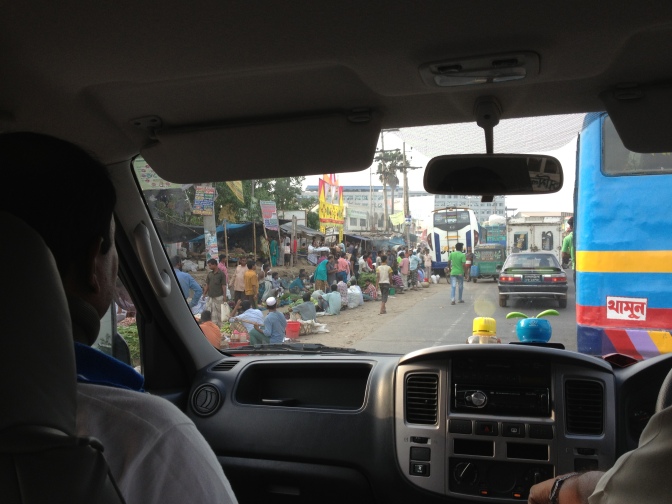10 things I learned in Bangladesh
Ben’s just got back from a story gathering trip to Bangladesh, with the brilliant film-maker Gemma Atkinson from Fat Rat Films, and the also-brilliant photographer Rachel Corner from, err, Holland. They were there to get photos, films and written case studies of the people Oxfam is helping, which will be used to raise money, support our campaigns, or just to say ‘thank you’ to our supporters. Ben collects his thoughts below.
It was an incredible trip in so many ways, and right now my head is buzzing with thoughts, moments and inspirations. We’ll share the photos and films of the incredible women we met in the weeks ahead, but to give my random assortment of memories some sort of coherence, I thought I’d write down a top ten of things I learned in Bangladesh.
1. Timing is everything
If you want to show chilli farmers surrounded by fields of ripe, red chillies, try to visit during the harvest rather than a month before. That’s all.
2. Clichés can still be true
As a writer at Oxfam, there are certain phrases you see so often you start to wonder what they actually mean. Visiting projects and talking to women here brought to mind a lot of the words we use so automatically, and made me realise they are actually based in reality. These were the ‘remote communities’ we talk about, cut off from the mainland, from local services, and from the support they deserve. They were getting ‘access to markets’, by linking up with local food companies who bought their produce in bulk at a fair price. And they were ‘working their way out of poverty’ – they weren’t getting hand-outs, and they weren’t waiting for help. They were working long days to ‘feed their families’, and to save money for their children’s future.
3. The people are ace
There was the strident and slightly bonkers grandmother Amena Begum – the ultimate matriarch, barking orders at her extended family and bossing the local chilli farmers’ group. There was the mischievous Isa Banu who, when given a print out of her photo by our photographer Rachel, said: “This is all very nice, but I work hard every day – I’d prefer to have you do some work!” And there was the sweet and welcoming Saleha Begum, who invited us in for a peaceful early morning breakfast of chapattis and fried egg.
4. It’s all about our partners
This trip brought home to me again how much we depend on our partner organisations and their tireless staff. These are the people who spend months getting to know the families we support, building up trust. They know everyone by name – they listen to their problems, offer words of advice, and help them get government support. Without this close bond, Oxfam’s work would fail. The closest thing in our society would be a social worker, I guess. A really brilliant, sensitive, passionate social worker.
5. Driving is terrifying
Like a bit of adrenalin sport? Sit in the front seat of a car in Bangladeshi as it negotiates one of the main roads. In the space of five minutes you’ll have narrowly avoided a head-on collision with a speeding bus, weaved out of the way of a battered truck, slammed on the breaks in front of a lazy cow, and swerved past an elderly man balancing a dozen 15ft bamboo poles on a tiny rickshaw.
6. Bangladesh is troubled
I’ve been to the country a few times before, and I’ve always felt it was a very peaceful place making real progress. This time, there was widespread political unrest, and nationwide hartals (strikes) which brought everything to a standstill for many of the days we were there. It was a reminder that Bangladesh still has its troubles – emphasised by the recent factory collapse and violent political demonstrations.
7. I’m famous
Wherever we went, we were surrounded by hoards of inquisitive-but-friendly locals, scrutinising our every move. Waiting for a train back to Dhaka, more than 50 people formed a polite semi circle around us on the platform, gawping in intense silence at the funny white people. And when we ventured out to celebrate the Bengali New Year, over-excited locals swarmed around us, asking for hugs and photos. We even made the Bangladeshi news. Unnerving.
You’d think there would be water everywhere in Bangladesh, wouldn’t you? We certainly did. But, just our luck, the usually vast river next to the village we visited was at its lowest level for 20 years. And that meant the walk to the community was across a massive, featureless river bed. With the river at its normal height, the walk would take 10 minutes. When we were there, it took an hour. A very hot, sweaty hour.
9. Oxfam is right
When I got back, my Dad asked me if I still agreed with Oxfam’s approach to development – you know, helping communities to help themselves, providing training and making links, rather than just giving people stuff. Having seen the work in action again, I could wholeheartedly say ‘yes’. Sure, ‘training’ and ‘access to markets’ is less sexy, and less easy to communicate, but it means communities learn to support themselves, and claim the support and services they are entitled to.
10. I’m 6 on the Atkinson scale
After two weeks of living in close proximity, people get a bit, well, relaxed in each other’s company. So it was that, by the end of the fortnight, we got to discussing the firmness (or otherwise) of our poos, based on a scale devised by our erstwhile film-maker Gemma. Sorry, am I over sharing?






Loved this blog! Great snaps and great snapshot of the place and Oxfam’s work there. Was particularly interested in number two (and I’m not referring to point 10) and number nine in this sense.
Great snaps..
Great Blog Ben… you’re the man… 🙂